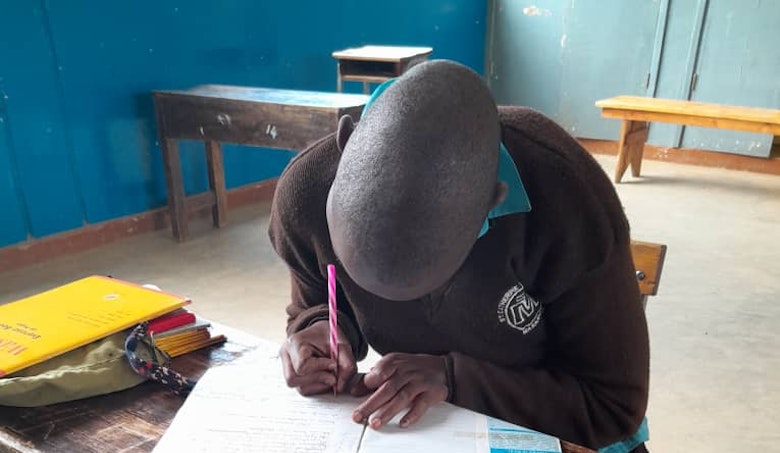Trisper: Thriving in school and empowered to know her rights and pursue her dreams
Trisper*, 13 years old, suffered from polio illness resulting in disability at the tender age of 7 years. This disability denied her the opportunity to pursue education, as she could no longer walk to school again. Fortunately, she was identified by the GIVE 2 Project team and she was taken to a rescue camp. She has been provided with a tricycle which has enhanced her mobility, allowing her to move independently from place to place.
Life at home
Trisper lived with her father, mother and four siblings in Tarime District, Tanzania. Their homestead comprised three mud houses with grass roofs. One house is for the children, while the parents occupy the other house. The third house serves as the kitchen and cattle room. Additionally, there is a small mud-and-grass latrine standing at a distance from the houses. The family relies on rainwater for domestic use and occasionally fetches water from a river located a kilometre away.
Trisper´s father and mother are the sole providers of the family. The source of livelihood is small-scale agriculture where they earn approximately 10 Euros per month. They cultivate maize, cassava, millet and bananas just for consumption. As there is no surplus, it is difficult for them to earn enough money to cater for meals and education. The children occasionally lack essentials due to financial constraints.
Illness that resulted in disability
Growing up, Trisper attended school and carried out her daily activities including cleaning the environment, maintaining her personal hygiene, participating in sports and games and also actively participating in religious activities. Sadly, her life took a drastic turn in 2018 when she contracted polio at the age of 7. Instead of seeking medical treatment, her parents, influenced by traditional beliefs, consulted a witch doctor, who failed to give her proper treatment. This condition resulted in her disability.
Vulnerable to Exploitation
Trisper's disability rendered her vulnerable to exploitation. She was at risk of mutilation and early marriage. Regrettably, her fundamental rights to education and play were denied due to prevailing beliefs within the Kurya community. In this community, a child with a disability is often perceived as a 'curse' upon the family. Influenced by this belief, Trisper´s parents decided to send her to be mutilated when she was only 11 years old. They went as far as talking with a mutilator to perform the ´cut´ on her.
¨I loved to attend school but it was difficult because of my disability, so I was just enclosed inside alone, while my relatives and my friends attended school and my parents went to the shamba. Nobody cared about me as a human being or as other children.¨ Trisper narrated.
The Rescue
Luckily, in October 2022, Trisper was identified by a good samaritan living in the same village. The samaritan alerted ATFGM members about Trisper´s situation and later informed the district social welfare officer. Thereafter, she was taken to a rescue camp where she is currently living safely.
In 2023, with the generous support of TdH NL through the GIVE TZ 2 project, Trisper was supported to continue with her education. ATFGM enrolled her in school providing her with essential school materials like uniforms and exercise books. She was enrolled in school in standard two and she has since progressed to standard three.
At the camp, Trisper receives all basic needs. She is provided with medical support, psychosocial support, and life skills training. She received a tricycle that enables her to move around from one place to another with ease. Additionally, she is also supported to know her rights as a child living with a disability.
¨The tricycle which I received from ATFGM has assisted me much in going to school but also in my movement from one place to another.¨ She stated.
New Routine
Trisper's daily routine at the camp involves attending classes, cleaning the house, engaging in sports and games, and studying. During the weekends, she watches TV, washes her clothes, attends church mass and has fun with her fellow students.
Empowered
Trisper has found a reason to pursue her dreams. She now knows how to read and write and gets opportunities to socialise with her fellow girls at the camp and school. She is also fluent in Kiswahili and is trying to pronounce some English words.
¨I am happy. The support I receive from ATFGM makes me feel happy always.¨Triper explained.
Overall, Trisper is living a better life at the camp and being treated well with love. Her parents were sensitised on the rights of children with disabilities (CWDs). Pre-reintegration is in progress and her father is involved in contributing to some of the school items.
An aspiring teacher
Trisper is passionate about drawing and playing. She explained her passion for becoming a teacher ¨I like to study to University level and be a teacher of young children with disabilities.¨ She concluded.

